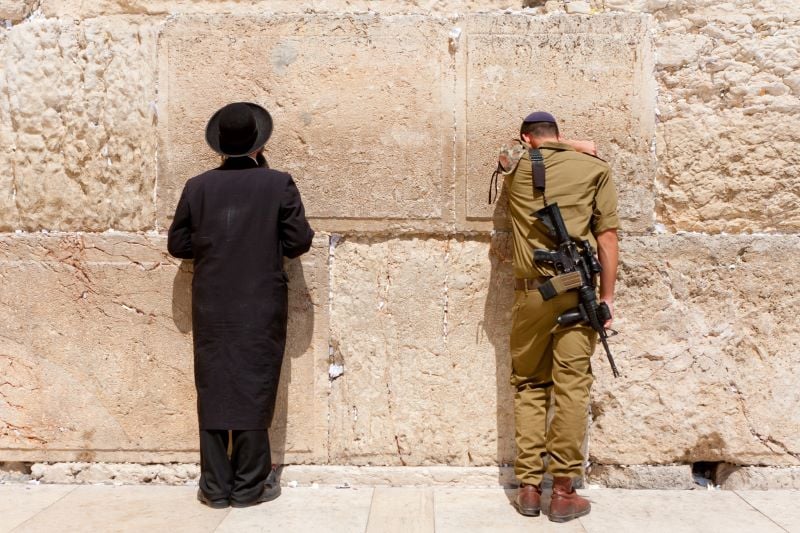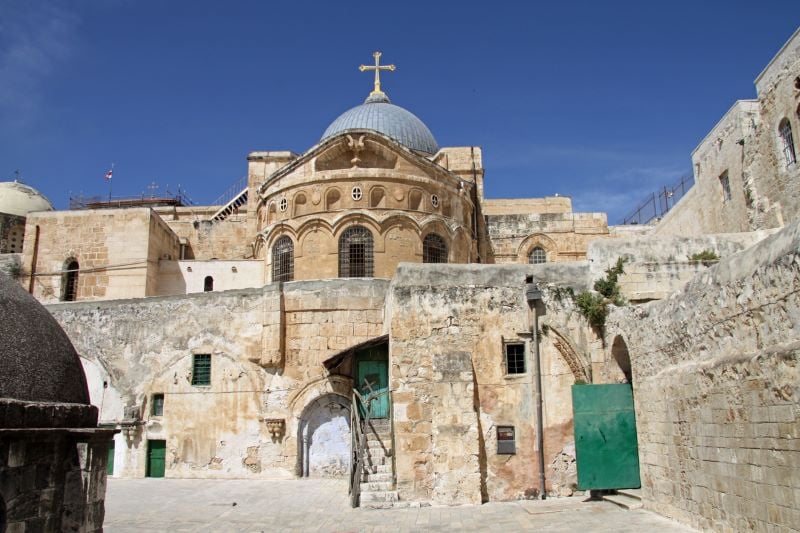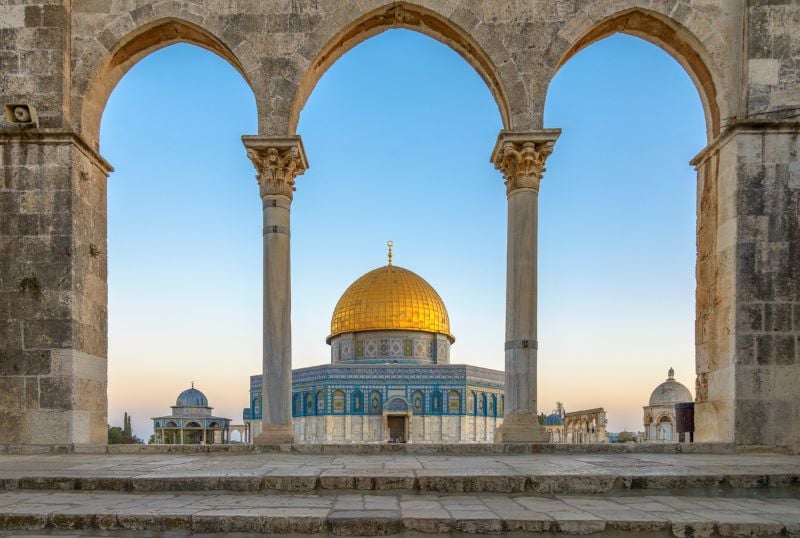Judaism, Christianity and Islam all claim Jerusalem as holy to their faith. Why do they hold it in high regard? What are the differences that separate them?

The city of Jerusalem has a long and extensive history of being the center of religious conflict. More than 50 wars have been fought in and around Jerusalem in the past 4,000-plus years, and most have been religiously motivated.
To understand why three major religions claim Jerusalem today, we have to look at the history of these religions.
A brief history of Judaism
Judaism is the oldest surviving monotheistic religion, arising in the Eastern Mediterranean in the second millennium B.C. Abraham is traditionally considered to be the first “Jew” and to have made a covenant with God (Genesis 17). He was actually a “Hebrew” (a descendant of Eber, Genesis 11:15-27; Genesis 14:13). Abraham worshipped and sacrificed to God in Salem (Jerusalem, Genesis 14:18; 22:2; 2 Chronicles 3:1).
Because Judaism, Christianity and Islam all recognize Abraham as a prophet, they are called the “Abrahamic religions”; and all of them claim Jerusalem as a center of worship.
Jerusalem history
The history of Judaism and Jerusalem goes back about 3,000 years. After Jerusalem became the capital of ancient Israel and Judah, King David moved the tabernacle to this location (2 Samuel 6). King Solomon built the first temple here (2 Chronicles 6). After the division of Israel, the nation of Judah (the Jews) continued to worship in this temple.
In 586 B.C. the nation of Judah fell, and the temple was destroyed. It was rebuilt by the Jews during the time of Ezra and Nehemiah (Nehemiah 12:27; Ezra 9:9). Later, because of extensive renovations by Herod (John 2:20), this second temple became known as Herod’s temple.
The Temple Mount
Herod’s temple was destroyed by the Romans in A.D. 70, just as Christ had prophesied (Matthew 24:2). A small portion of the foundation wall on the west side of the Temple Mount survives to this day. This wall was not part of the temple itself. It was simply part of the outer wall surrounding the Temple Mount.
As the closest remaining remnant of the temple, it became and remains the holiest location for Jews. Because of the passionate prayers offered by Jews at this Western Wall, some gentiles (non-Jews) began calling it the Wailing Wall.
Jerusalem: photo of the Western Wall, holy to Judaism.
While the Roman Empire dispersed the majority of the Jews after the destruction of Jerusalem in A.D. 70, some Jews remained in Palestine for over a millennium. After the exile of most of the Jews from their former capital city, these people lived in various countries in what is called the “Diaspora” (dispersion) until the founding of the State of Israel in 1948.
Jews return to Israel
After 1948, Jews from all over the world came to settle in modern Israel. Having returned to their homeland, they found that various subcultures with distinctive histories, languages, religious practices and customs had developed among themselves while they were in the areas to which they had been dispersed.
Several variations in belief exist within Judaism today. Orthodox Jews believe that Jewish law is unchanging and mandatory. Conservative Jews argue that God’s laws change and evolve over time. Reform and Reconstructionist Jews believe that these laws are merely guidelines that individuals can choose to follow or not follow. There are also many Jews in Israel who are secular or atheist. For them, Judaism is their culture rather than a religion.
In general, Jews believe in one God and His prophets, with special respect for Moses as the prophet to whom God gave the law. Jewish law is embodied in the Torah (the first five books of the Bible, also known as the Pentateuch) and the Talmud (a commentary on the Torah completed in the fifth century after Christ).
A brief history of Christianity
Jesus Christ founded Christianity in the first century in Jerusalem (Acts 2). The early Christian Church fled from Jerusalem prior to the destruction of Jerusalem in A.D. 70. The Church was scattered (Acts 8:1) and eventually settled in cities throughout the Roman Empire, especially in Asia Minor (Turkey), Jordan and Syria. It was considered a sect of the Jews during the first and second centuries. Because of its Jewish roots and observances, it was heavily persecuted.
Persecution of the early Christian communities continued until Emperor Constantine converted to Christianity in 324. The form of Christianity practiced by Constantine and the Roman Empire had already begun changing the original practices of the first-century Church. Yet the city of Jerusalem remained important to Constantine and the Roman church because of all the holy sites in and around the city. Constantine and the Roman emperors who followed him built several Christian churches and shrines there.
Jerusalem: The Church of the Holy Sepulchre is shared by various Christian denominations.
Numerous branches of Christianity developed from major and minor splits. The Orthodox Church and its patriarch split away from the Roman Catholic Church and the pope in 1054 because of political and doctrinal differences. In the 16th century, Martin Luther, upset at the corruption of the Catholic papacy, spearheaded a reformation movement that led to the development of Protestantism.
However, Jerusalem remained a focal point as the birthplace of Christianity in all its forms. Today it is considered one of the most important Christian cities in the world because of the many Christian shrines, churches and historical sites. Each year millions of Christians make pilgrimages there to visit those religiously significant locations.
A brief history of Islam
Muslims (adherents of Islam) believe that Allah (the Arabic word for God) sent His revelation by the angel Gabriel to the prophet Muhammad over a period of 23 years in the seventh century and that Muhammad shared these revelations with his companions, who later wrote them down. These writings were compiled in a book called the Koran—meaning “recitation.”
Islam today is a religion centered upon the Koran and the life of Muhammad, who is revered as God’s final prophet. It developed from both the Judeo-Christian tradition and the cultural values of the nomadic Bedouin tribes of Arabia.
Islam expanded into areas controlled by the Byzantine Empire. By the mid-eighth century, Islam had spread west into North Africa and Europe and east into Central Asia. Over the centuries, Islam continued to grow in sub-Saharan Africa, South Asia and Southeast Asia.
As Islam expanded, the new Islamic societies adapted many of the customs they encountered. As a result, Muslims in different areas of the world created a wide variety of cultural traditions.
Al-Aqsa Mosque and Dome of the Rock
The three most holy shrines in Islam are found in Mecca, Medina and Jerusalem. Mecca is the traditional place where the Koran was revealed. Medina is the burial place of Muhammad. And, according to Muslim tradition, Jerusalem (site of the Al-Aqsa Mosque and the Dome of the Rock) is the place from which Muhammad ascended to heaven.
Jerusalem: The Dome of the Rock, holy to Muslims.
Today the Muslims have control of the Al-Aqsa Mosque and the Dome of the Rock on the Temple Mount in Jerusalem. They consider Jerusalem one of their most holy places of worship.
The struggle between Christianity, Judaism and Islam
Although Christianity developed out of Judaic roots and texts, a wide variety of Christian churches and beliefs have developed. Those who maintained the beliefs and practices of the early New Testament Church, including the seventh-day Sabbath, soon became a minority.
Christian beliefs evolved over time in the Roman Church, with the largest group of Christians coming to believe that the “Jewish” law was abrogated in favor of a universal gospel. Those Christian beliefs evolved further with the Protestant Reformation and subsequent splits and divisions.
Christians believe that Christ is God, while Jews do not. They also disagree on many other doctrines and teachings. (Of course, Christian churches also have many disagreements among themselves.)
Relationships between Jewish and Christian communities have often been strained and difficult, particularly in Christian Europe. There, Jewish communities were often subject to discrimination and violence at the hands of Christians.
Today, there are many European Jews living in and around Jerusalem who strive to keep the memory of their persecuted past alive with memorials in Jerusalem (Yad Vashem), in Europe (Auschwitz-Birkenau Memorial and Museum) and in the United States (Holocaust Memorial Museum and Simon Wiesenthal Center).
Christianity has also had a problematic relationship with Islam. Christians do not accept Muhammad as a prophet. While many Christians in the Middle East converted to Islam during and after the seventh century, the church hierarchy in Rome and Constantinople considered Islam to be both a political and theological threat. The Crusades were an unsuccessful attempt to reverse the Islamic conquest of the Eastern Mediterranean. Jerusalem was often in the middle of this tug-of-war between all three religions and their followers.
Islam views Judaism and Christianity as earlier versions of Islam, with revelations given by Allah but misunderstood over time by Jews and Christians. Muslims see Islam as the final, complete and correct revelation in the monotheistic tradition of the three faiths.
Islam recognizes many of the Jewish and Christian prophets, including Abraham, Moses and Jesus (although they consider Him to be a prophet and not the Son of God).
Many non-Muslims mistakenly believe that Muhammad is the equivalent of Jesus in the Islamic faith, but it is the Koran that stands in the same central position in Islam as Jesus does in Christianity. According to Muslim beliefs, Muhammad himself is not divine, but a prophet chosen by God to deliver His message and an example of piety.
“People of the Book”
The relationship Muslims have with Jews and Christians is rocky. While some Muslims state that Jews and Christians are specifically protected in the Koran as “People of the Book,” others—especially those of militant factions—consider Jews and Christians to be infidels who must be destroyed so Islam will prevail over all religions.
While Islamic legal tradition has generally upheld the rights of Jews and Christians to maintain their beliefs and practices within their communities in Islamic countries, no Muslim may convert to Judaism or Christianity without coming under the death penalty.
Now that you understand the historical background that shows why three major religions claim Jerusalem as one of their holy places of worship, you need to understand how this dispute will be resolved. See our articles on “Middle East Conflict” and “Peace in the Middle East.”




